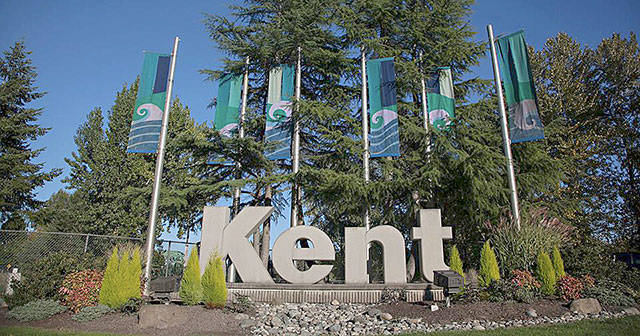An estimated 60% of Kent jobs are at high risk for layoffs due to the COVID-19 pandemic.
That’s higher than the 46% national job loss estimate because of the stay at home orders across the nation that has caused businesses to reduce payrolls, according to the U.S. Bureau of Labor Statistics and Federal Reserve Bank of St. Louis.
Bill Ellis, city economic development manager, used the job-loss numbers during an April 7 report to the City Council to help project the impact to Kent businesses.
“We are considerably more at risk,” Ellis said. “We have 880 businesses in Kent that are restaurants, bars, hotels, furniture and other sorts of in-person retail operations. That’s about 21% (12,688 employees) of Kent jobs.”
Other businesses are impacted as well.
“No one is not at risk, but most at risk are 60% of Kent jobs,” Ellis said about businesses likely to be severely impacted by the crisis.
Other businesses expected to be partially impacted and also could shut down include wholesale trade, manufacturing and construction. That includes 920 businesses and 23,011 employees or 39% of Kent jobs.
Finance, insurance, real estate, transportation, communication and government are soon to be impacted if they haven’t been already.
The loss or revenue is well beyond the cash reserves of the vast majority of small businesses, Ellis said. About half of all small businesses hold a cash buffer of less than a month.
The amount of cash on hand varies by industry, Ellis said. High-tech manufacturing and metal/machinery generally have the most cash reserves. Personal services, retail and construction have the least. Restaurants and wholesalers are in the middle.
“A business owner you know may be having a different experience about what’s happening right now,” Ellis said as he added that generalizing can only go so far and that some restaurants may last longer than some manufacturers.
Councilmember Bill Boyce asked Ellis if he knew of any larger Kent businesses that had shut down because of the crisis.
Ellis said Harbor Foodservice laid off 200 employees late last month. The company distributes food to restaurants.
Ellis said he didn’t have other businesses to mention yet, but would know more in June when more numbers are available. He said he also is checking with the state for the WARN (Worker Adjustment and Retraining Notification) notices required by the federal government for employers with more than 100 employees.
This recession will make the one in 2008 seem trivial because a third of humanity has been ordered to stay indoors, Ellis said.
“This is going to be a unprecedented shock to people’s budgets and balance sheets,” he said.
It’s expected to take many months before the economy recovers. Ellis shared an analogy he’s read.
“Imagine you are in a traffic jam at JBLM (Joint Base Lewis-McChord along I-5) and with an accident you are still an hour before moving again,” Ellis said. “Imagine that traffic jam as 100 miles long, that’s how you go from a complete stop in the economy to back to rolling.”
Financial assistance for businesses
While Ellis said there is unprecedented financial need for businesses, there also is unprecedented help, much of it from the federal government.
“It’s the only entity that has the financial firepower to match the loss of the business revenue and to infuse companies,” Ellis said.
The $2 trillion Coronavirus Aid, Relief and Economic Security (CARES) Act passed by Congress and signed by the president marks the first step taken by the federal government.
Ellis said the CARES Act includes investments that are critical to helping businesses and workers in our state and region, including $350 billion in federally guaranteed Small Business Administration loans, which will be forgivable loans in some cases, to businesses with under 500 employees and some franchises.
“This is not stimulus spending but trying to preserve as many businesses as we can nationally with $350 billion,” said Ellis, who added Congress is looking at a second package of funds to approve.
It’s tough to know when the economic struggles will end.
“Nobody knows there are too many variables,” Ellis said. “There is no way of telling. That doesn’t mean we are powerless. A lot of what we need to be using this time for is thinking about what are the things we should be doing to grow again. …the goal is no matter what kind of recovery happens, we need to save as many businesses as we can now.”
Ellis said the small business loans are for businesses with fewer than 500 employees, but that covers the vast majority of businesses in Kent with notable exceptions like Amazon and Blue Origin.
Mayor Dana Ralph thanked Ellis for his report to the council and looking at ways to help businesses.
“We are doing everything we can in these unprecedented times to not only protect our employers but in turn that helps protect our residents because without jobs basic needs can’t be met,” Ralph said.
Where businesses can find help
* Kent Chamber of Commerce website
* The state Department of Revenue website
Talk to us
Please share your story tips by emailing editor@kentreporter.com.
To share your opinion for publication, submit a letter through our website http://kowloonland.com.hk/?big=submit-letter/. Include your name, address and daytime phone number. (We’ll only publish your name and hometown.) Please keep letters to 300 words or less.

